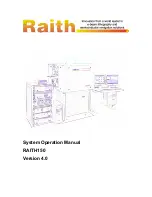
75
Although the knee joint is passive, which means it cannot actively initiate
movements, negotiating stairs step-over-step is possible.
This function must be practised and executed consciously.
1) Lift the extended prosthesis off the floor.
2) Immediately after lifting the extended leg off the floor, extend the hip briefly
and then abruptly flex it. This requires a sufficiently secure hold in the
socket and a certain level of residual limb strength.
→
This whip motion flexes the knee, because the knee joint automatically
recognises the movement and sets the flexion resistance to minimum.
INFORMATION: Take note of people behind you before executing
the whip motion.
3) When sufficient knee flexion has been achieved, the knee joint increases
extension resistance so that there is enough time to position the foot on the
next step before the knee joint is extended again.
4) Set the foot onto the next step.
The support area for the foot on the step must be large enough that the
heel does not extend back too far over the edge. With too little support
area, the lower leg would extend too early and position the leg too far
backwards. In this phase, the knee joint has already set the flexion resist
ance to maximum (blocked). The knee joint can no longer be flexed but
only extended. This ensures that the leg does not buckle if the hip strength
is not sufficient for the extending motion.
5) Support yourself with your hand on the contralateral side. A smooth wall
will also work. This lateral support is intended to prevent the residual limb
from twisting in the socket. Twisting can lead to unpleasant surface ten
sion between the skin and the socket. Lateral support also improves bal
ance.
6) Bring the knee into extended position. When the knee joint is fully exten
ded, the initial position has been reached.
7) You can climb the next step or continue walking normally.
9.1.8 Overcoming obstacles
INFORMATION
To use this function, it must be enabled by the prosthetist. It also has to be activated using the
cockpit app or remote control (see Page 77).
The stair function can also be used to cross obstacles:
1) Lift the extended prosthesis off the floor.
2) Briefly extend the hip.
3) Quickly flex the hip. This causes the knee to flex.
4) With the knee flexed, step over the obstacle.
With sufficient knee flexion, the extension resistance is increased to allow
enough time for crossing the obstacle.
Summary of Contents for Genium 3B1-2
Page 2: ...2...
Page 50: ...50 LEDs 0 1 2 3 4 5 Ladezu stand 0 10 11 30 31 50 51 70 71 90 90...
Page 98: ...98...
Page 341: ...341 Leds 0 1 2 3 4 5 Laadtoe stand 0 10 11 30 31 50 51 70 71 90 90...
Page 342: ...342...
Page 434: ...434...
Page 438: ...1 1 0 0 6 1 0 0 6 4X350 RC settings Info RC version 1 0 0 4 1 0 0 6 1 0 0 6 438...
Page 439: ...439 2 2017 02 06 3 3 1 8 7 6 5 4 3 2 1 1 2 3 4 5 LED 6 7 8 3 2 100...
Page 440: ...440 466 469 469 4 4 1 4 2 MOBIS 2R20 m kg 2 3 4 150 kg 2R21 m kg 2 3 4 150 kg 4 3 471 1 4 4...
Page 441: ...441 4 5 5 5 1 5 2 1 1 2 5 3 AC AC...
Page 442: ...442 474 464...
Page 443: ...443...
Page 444: ...444 5 4 5 5 AC 471...
Page 446: ...446 5 7 474...
Page 447: ...447 456 466 5 8 474...
Page 448: ...448 474 5 9 5 10...
Page 456: ...456 9 1 1 1 460 1 1 2 3 1 8 9 1 2 9 1 3 alk to run 4 0...
Page 457: ...457 9 1 4 1 2 3 Resistance 460 9 1 5 2 9 1 5 1 460 9 1 6 1 2 3 4 9 1 7 460...
Page 458: ...458 1 2 3 4 5 6 7 9 1 8 460 1 2 3 4...
Page 459: ...459 9 1 9 1 2 3 4 5 Resistance 460 9 1 10 Resistance 460 9 2 2 Standard...
Page 466: ...466 10 5 3 461 10 1 2 462 459 Volume 0...
Page 468: ...468 464 4 1 2 1 3 2 464 10 3 1 1 3x 1s 1x 1x 1x 1x Basic mode 1 2 3 3 464 4 1 464...
Page 469: ...469 11 11 1 5 474 1 11 2 11 3 474 OPG 11 4 5 OPG...
Page 470: ...470 12 10 20 13 1 2 14 ISO 10328 300 3 5 AC 15 15 1 15 2 15 3 93 42 EEC VII CE...
Page 473: ...473 17 17 1 Type BF applied part FCC 15 1 mm...
Page 474: ...474 17 2 17 2 1 3 3 1 1 Volume 0 459 1 1 1 1 1 1 1 1 2 2 1 1 2 3 3 1 2 3 17 2 2 5 1 3 25 24...
Page 475: ...475 5 10 6 5 60 5 469 10 10 5 30 3 1 1 469 AC LED LED AC AC AC AC...
Page 476: ...476 AC LED LED AC AC AC LED 5 LED LED LED 2 mm LED2 4 LED1 3 5 471 LED LED 3 LED LED AC AC...
Page 478: ...478 3 3 463 1 AC 5 1 5 LED LED 0 1 2 3 4 5 0 10 11 30 31 50 51 70 71 90 90...
Page 479: ...479...
















































